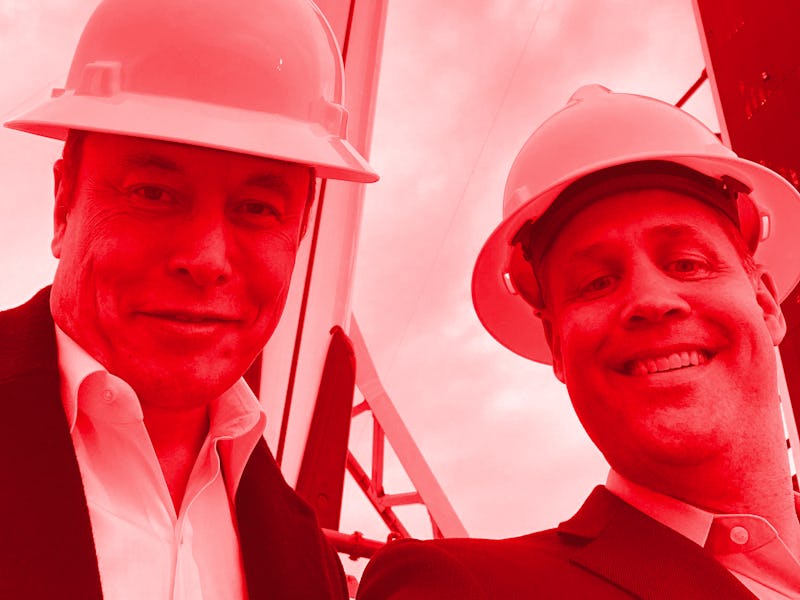A brief guide to Elon Musk's complicated relationship with NASA
Trouble in extraterrestrial paradise?

It seemed like a match made in aerospace commercialization heaven; a space agency wanting to get commercial crew flight off its plate to make way for an impending lunar mission, and a private company in need of funds to kickstart its space colonization masterplan.
Recently, however, tensions resulting from this odd pairing of overlapping interests started to play out in public.
NASA’s administrator Jim Bridenstine and SpaceX CEO Elon Musk have been engaged in a space diss-battle, and Musk may have just had the ultimate clap-back during an interview with CNN on Saturday night.
It all started on Friday, the day before Musk was scheduled to make his big Starship announcement, revealing the prototype to the spacecraft designed for commercial space travel.
Bridenstine not so-subtly-tweeted on Friday, “I am looking forward to the SpaceX announcement tomorrow. In the meantime, Commercial Crew is years behind schedule. NASA expects to see the same level of enthusiasm focused on the investments of the American taxpayer. It’s time to deliver.”
The NASA administrator is referring to the NASA’s plan to sent astronauts to low-Earth orbit and the International Space Station with the help of private companies like SpaceX. Back in 2014, NASA signed multibillion dollar contracts with SpaceX and Boeing with an initial goal of having one of these spacecrafts up and running by the end of 2017.
Well, that didn’t exactly happen. Crew Dragon is the name of the in-development crew capsule being developed by SpaceX. NASA refers to the efforts by Boeing and SpaceX as “commercial crew.”
The SpaceX Crew Dragon is seen in this rendering. The spacecraft would carry astronauts to the ISS, ending US reliance on Russia and its Soyuz capsule to ferry NASA astronauts between Earth and the ISS.
While Bridenstine is correct that the program has had massive delays, whether or not SpaceX is entirely to blame is another question.
When Musk was asked about Bridenstine’s comments during a question-and-answer session on Saturday, he reiterated that Starship has by no means been a distraction from SpaceX’s plans with NASA.
“Let’s be clear, it was really quite a small percentage of SpaceX that did Starship.” Musk told reporters. “Less than five percent of the company, basically.”
“The really hard part that requires a lot of resources is optimising something past the initial prototype phase and bringing it into volume production,” he added.
Watch that moment here:
However, in another interview, Musk took a stab at Bridenstine during an interview with CNN. When asked for a reaction to the NASA accusations, Musk laughed and mockingly asked, “Did he say Commercial Crew or SLS?”
Musk’s cold burn is referring to long-delayed NASA Space Launch System, a $14 billion worth heavy-lift launch vehicle for deep space exploration that has endured multiple delays and may be on the verge of being called off altogether.
“First of all, everything in aerospace is years behind. It’s really a question of, relatively speaking, which one is more late,” Musk continued during the interview.
“Most of the work required for now for flight of NASA astronauts is a long series of safety reviews, it’s not really hardware related and it’s really going as fast as we can make it go,” he said. “If there’s some way to make it go faster, I would make it go faster.”
It’s hard to believe that earlier this year, the pair were a shining example of public-private partnerships as they shared in the glory of the successful launch of SpaceX’s Dragon spacecraft in March.
However, it’s safe to assume that things started to go sour a few weeks later when the spacecraft exploded during a ground test due to a leaky valve.
Bridenstine may also be feeling the pressure of delivering on his earlier promises of making this partnership work, and in turn focusing on making good use of the $30 billion in funds directed at NASA’s planned Artemis mission to the moon in 2024.
NASA has been under heat lately, with some members of the public not fully on board with the agency’s future mission to the moon. On the other hand, Musk’s plan to colonize Mars sounds a lot more exciting to a general audience.
It’s long been clear that Musk is the probably the world’s biggest NAS fan, declaring at the National Governors Association meeting in July, 2017 that his password at some point in his life was, “I Love NASA.”
It might just be that he also thinks SpaceX can do a better job than NASA when it comes to building rockets.